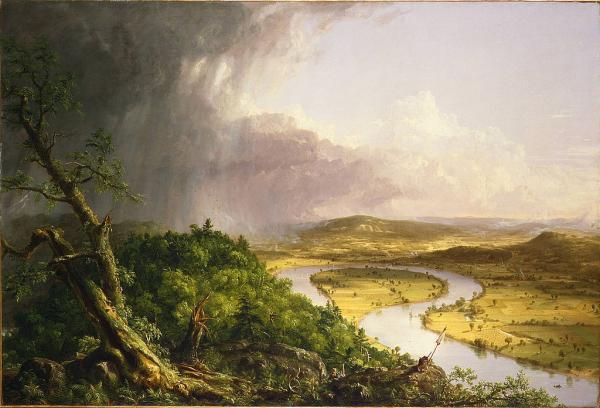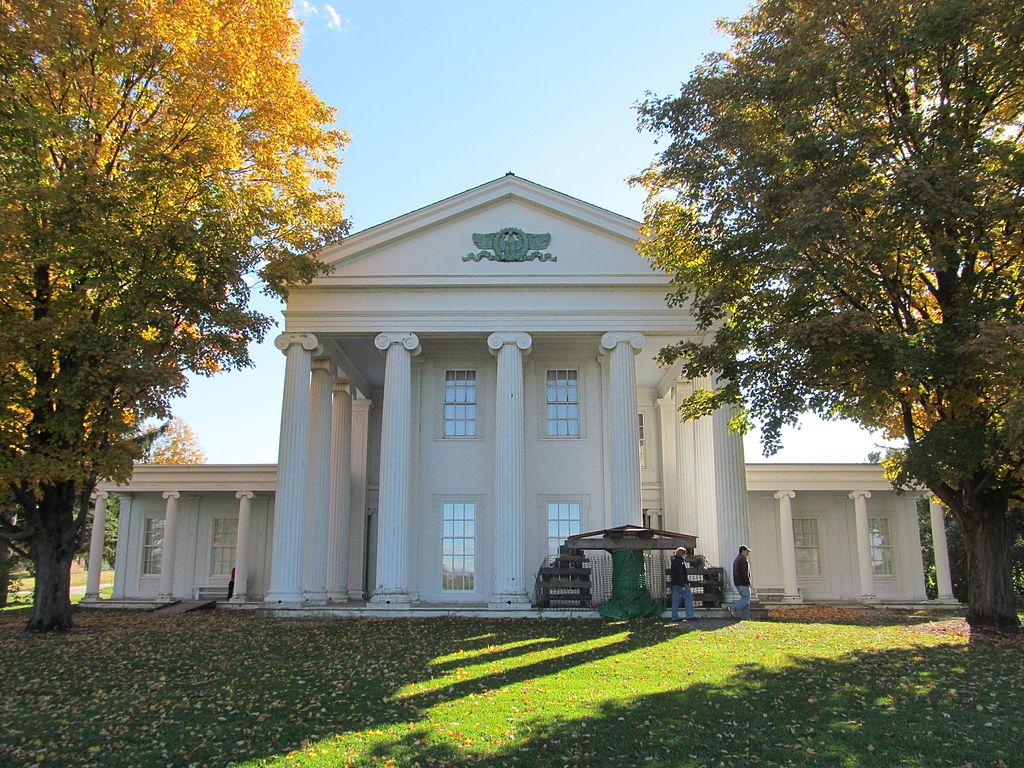Addressing Our Changing Climate Through the Humanities

Thomas Cole. View from Mount Holyoke, Northampton, Massachusetts, after a Thunderstorm. 1836, oil on canvas.
The Metropolitan Museum of Art, New York.

Thomas Cole. View from Mount Holyoke, Northampton, Massachusetts, after a Thunderstorm. 1836, oil on canvas.
The Metropolitan Museum of Art, New York.
In the fall of 2022, the National Endowment for the Humanities (NEH) announced American Tapestry: Weaving Together Past, Present, and Future, a special initiative leveraging the humanities to address some of the nation’s most pressing challenges, including our changing climate. Through the American Tapestry initiative, NEH has established two new grant lines, the Division of Preservation and Access’s Cultural and Community Resilience program and the Office of Challenge Programs’s Climate Smart Humanities Organizations program, that build upon the agency’s longstanding commitment to supporting humanities institutions and scholars as they protect our cultural collections, document climate history, and create new resources and educational programs focused on environmental humanities.
Studying the history of our climate gives us context for evaluating changes in our natural environment over an extended period of time. With a grant from NEH’s Office of Digital Humanities, teams from the Papers of Thomas Jefferson at Princeton University, the Center for Digital Editing at the University of Virginia (CDE), and the Center for Digital Scholarship at the American Philosophical Society (APS) are collaborating to create the North American Climate History (NACH) project, a free-access digital resource of the continent’s weather and climate data before 1850. The North American Climate History project aims to integrate work done by the NEH-supported Papers of Thomas Jefferson project, and CDE, on the Jefferson Weather and Climate Records, and the digitization, by APS, of the weather diaries of James Madison— also made possible in part by NEH funding—and records created by eighteenth-century astronomer David Rittenhouse into a single, searchable database that will allow researchers to track and compare weather observations and climatological data from the era.
Changing climate conditions also have serious implications for the preservation of important humanities collections. The increasing number of severe weather events requires cultural institutions to adapt their facilities, tools, and techniques, to ensure the survival of archival materials, artwork, and artifacts. Throughout NEH’s history, the agency’s Division of Preservation and Access has been at the forefront in helping cultural and educational institutions review and improve their infrastructure to protect humanities materials against climate-related damage. NEH’s Sustaining Cultural Heritage Collections program provides funding to libraries, museums, archives, and historical organizations to implement preventative conservation practices and purchase environmental monitoring tools and protective storage materials designed to safeguard irreplaceable cultural collections.
In Vermont, the Shelburne Museum is using an NEH grant to assess conditions in two museum buildings and develop an infrastructure improvement plan to respond to fluctuating temperatures due to climate change. This 45-acre immersive museum campus of 39 buildings houses an expansive and eclectic collection of 100,000 works of folk, decorative, and fine art. With NEH support, the museum will assess energy-monitoring and HVAC systems within two galleries of American and Impressionist fine art that include pieces by Andrew Wyeth, Grandma Moses, John Singleton Copley, Claude Monet, and Édouard Manet. This review will allow the museum to develop facility improvement plans to maintain optimal temperature and humidity conditions to preserve these works for generations to come.
Other NEH-supported projects foster sustainability initiatives at cultural institutions. The Monhegan Museum in Maine receiving NEH funding to improve the museum’s energy efficiency through improved lighting and non-mechanical climate control for seasonal displays, while optimizing off-season storage vaults for items that chronicle the history of Monhegan Island, Maine, from the mid-nineteenth century to today. NEH’s Office of Challenge Programs also supports cultural institutions as they work to preserve collections and improve the capabilities of their facilities and teams through the Infrastructure and Capacity Building Challenge Grants program. North Carolina’s Reynolda House Museum of American Art, built in 1917 as the home of Katharine and R. J. Reynolds, used an NEH Infrastructure and Capacity Building Challenge grant to make needed repairs to its 100-year-old signature tile roof to protect the historic house and its collection of American paintings for the next century.
In addition to supporting long-term preservation and renovation projects at cultural institutions, NEH also provides emergency funding to organizations to assist recovery from severe weather events, including hurricanes, flooding, and wildfires. In July 2022, Kentucky experienced historic levels of rainfall and destructive flooding, leading to 39 deaths and significant damage across central Appalachia. In the months that followed, as communities began recovery efforts, NEH made an emergency Chair’s Grant to the Foundation for Advancement in Conservation’s National Heritage Responders (NHR) program. With support from NEH, NHR sent a team to Whitesburg, Kentucky, to support local cultural organizations impacted by the flooding, including Appalshop, an Appalachian media production and preservation organization. The NHR team trained Appalshop staff in cleaning damaged film reels so that they could salvage thousands of tapes and assess storage options for the collection as recovery continued. Additionally, NHR sent protective equipment and supplies, including HEPA vacuums, to sites across the region, and plans to conduct additional trips in 2023. In January 2023, Appalshop was also awarded direct funding from NEH to continue its cleanup work and enable the salvage and digitization of archival films, including masters of documentaries, footage from the 1970s, and picture film.
Following disasters, NEH works closely with the 56 state and jurisdictional humanities councils to provide support to communities as they rebuild and develop plans for challenges yet to come. In August 2021, Hurricane Ida, a Category 4 storm, made landfall in Louisiana, becoming the second-strongest to hit the state on record, causing loss of life and catastrophic damage in communities across the region. NEH granted a $150,000 Chairman’s Award to LEH in November 2021 to support the recovery of humanities organizations impacted by Hurricane Ida, expanding the 2021 Disaster Mitigation Grants program started with an NEH award following floods in May of that year. “At LEH, we believe that every Louisiana community has important stories to tell and histories to preserve,” said Miranda Restovic, executive director and president of LEH. “With this critical support, we are ready to respond quickly to the needs of the many organizations that preserve, promote and protect our state’s rich cultural heritage, providing critical funding for recovery and mitigation.”
LEH used a portion of the Chairman’s Award towards disaster recovery for its headquarters at historic Turners’ Hall in downtown New Orleans, repairing roof damage and cleaning up water damage and a subsequent mold outbreak in the building. Following Hurricane Ida, LEH conducted an impact survey to assess damage to, and the needs of, cultural organizations in the state to guide the emergency grantmaking process and support organizations as they make long-term changes to their operations. With funding from the NEH award, LEH partnered with the Louisiana Association of Museums for its Humanities Disaster Preparedness for Cultural Organizations initiative, hosting webinars and producing resources for cultural organizations to develop plans for future weather events. In April and May of 2022, LEH hosted two streaming webinars (available on LEH’s YouTube channel in parts one and two) and produced a comprehensive guide to disaster preparedness with information on national and local resources, and templates for creating a disaster response plan. In the LEH impact survey, respondents estimated $1.2 million in revenue losses due to closures and cancellations, not including the additional costs of repairs. Through NEH grants, institutions are becoming more prepared for extreme weather events, protecting invaluable collections, and supporting the cultural economies of our communities.
As our climate continues to change, preparing the next generation of humanities professionals to research and respond to the challenges we face is a focus of NEH. With funding from the Division of Education Programs, the Humanities Connections grant program is supporting the development of humanities-oriented environmental and climate change studies curricula at higher education institutions. In Kalamazoo, Western Michigan University received a Humanities Connections Planning award to revise its existing minor in climate change studies to increase interdisciplinary collaboration and engage humanities faculty as Humanities Climate Change Fellows. Through their work with the current Climate Change Working Group, the fellows will assess strategies for integrating the sciences, social sciences, and humanities into an innovative curriculum that includes service-learning projects. The University of Tennessee at Chattanooga received a Humanities Connections Planning award in June 2022 to develop a humanities-informed environmental studies major. This new undergraduate major will integrate the humanities into environmental science and policy programs, giving students the opportunity to examine the historical context of contemporary environmental challenges and build the communication skills needed to produce positive change in their communities and our society.



